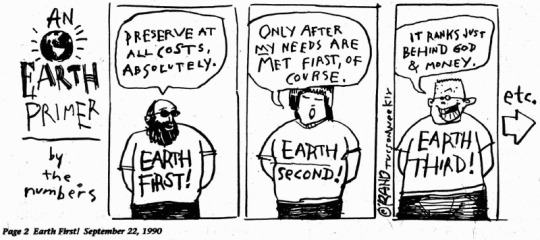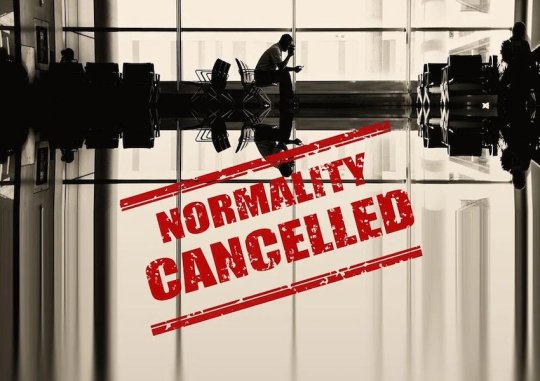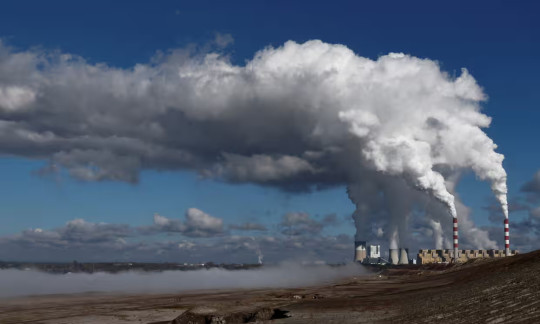#radical environmentalism
Text

Many politicians pledge to be dedicated to the environment, and to put environmental issues first, but in reality many people often prioritize their own needs before those of the earth's. If we want a place to live in the future, action needs to be taken now!
#eco anarchism#green anarchy#radical environmentalism#enviormentalism#environment#anarchy#eco anarchy#leftism#climate change#climate action
64 notes
·
View notes
Text
ALF edit (posted on discord so I don't have a link to the original, but there is a watermark, so credit to tadashikeii)
#monkeywrenching#environmentalism#deep ecology#radical environmentalist#radical environmentalism#green anarchy#anprim#anarcho primitivism#anti-civ#anti civ#animal liberation front#ALF#animal liberation#earth liberation
25 notes
·
View notes
Text
I've seen people be like "But how much violence and destruction is REALLY justified in protecting the environment??"
The answer is however much it takes you fucking clown act, you're not living in a god damned Care Bears special, you're living in the real world with real evil and greedy malicious parasitic bastards who only understand destruction, and have molded that precious political space of yours around their interests.
The life of every innocent person and creature on this planet is infinitely more important than your fucking feelings being hurt because someone blows up a pipeline that would poison people's drinking water or throws a ceaselessly greedy oil baron off a building or whatever.
19 notes
·
View notes
Text
ENVIRONMENTALISM: THE ROLE OF SOCIAL SCIENCE AND HUMANITIES (ECO-ECONOMICS OR GEO-SOCIOLOGY?)
ENVIRONMENTALISM: THE ROLE OF SOCIAL SCIENCE AND HUMANITIES (ECO-ECONOMICS OR GEO-SOCIOLOGY?)
Posted on 27/11/2022
DOI: 10.13140/RG.2.2.25054.48963/1
Abstract
The following papers, mainly written in Bangla, concentrate on the roles of social science and humanities in the domain of specialized environmental science. If the disasters caused by climate change are believed to be inevitable fact, as predicted by some of the scientists, what shall be done by the social “engineers” (!)? Is…

View On WordPress
#environmental activism#environmental movement#Environmentalism#geo-sociology#green anarchism#radical environmentalism
0 notes
Text
It’s Not Easy Bein’ Green
It’s Not Easy Bein’ Green
Expect to see the price of everything double, at the very least. Expect shortages of everything. Are you prepared?
By Rob Pue, Publisher – Wisconsin Christian News
Although I guess you could say there have been “earth worshipers” since just about the beginning of time, it was the civil unrest of the 1960s that spawned the radical environmental movement we’re dealing with today. It was an age…

View On WordPress
#Abortion#climate change#couples not having children#depopulation#empty store shelves#famine#food shortages#gas prices#gas rationing#Georgia Guidestones#global warming#Green New Deal#radical environmentalism
0 notes
Text

Portland!
Anti-trans bigots and hate group Women's Declaration International (WDI) are coming to town this Nov. 19th.
Save the date to give them the welcome they deserve :)
@antifainternational @anarchistmemecollective @kropotkindersurprise @radicalgraff
#portland#trans solidarity#usa#america#terfs#terf#november 19#2023#environmental activism#activism#political activist#class war#trans exclusionary radical feminist#trans exclusionists#antiterf#signal boost#signal b00st#signal boooooost#fuck off terf#transphobes#transphobia#fuck off transphobes#transgender#transisbeautiful#trans#united states#unitedstateofamerica#native american#amerika#humanrights
446 notes
·
View notes
Text
Your apathy does not make you cool, or noble, or interesting, or intellectually superior, it makes you a coward
#this is mainly aimed at my fellow middle class yt people btw#people who could do something but don't#hopecore#hopepunk#solarpunk#environmentalism#peaceful revolution#greenhorizon#anti capitalism#hope is a radical act#radical hope#on apathy
390 notes
·
View notes
Text
Just spent all day facilitating a citizens’ assembly and whew, I am exhausted but so inspired. You see ordinary people, who don’t seem radical or political, coming up with ideas for free public transport and a sharing economy, calling for rewilding and housing security for all. The public are so incredible when you just give people a voice and let them know their opinion matters. I really think direct democracy could change the world, but only if it’s given the power and influence to actually inform legislation
#solarpunk#hopepunk#environmentalism#social justice#optimism#community#climate justice#citizens’ assembly#people’s assembly#direct democracy#participatory democracy#radical organising
162 notes
·
View notes
Link
“Sure it’s a daunting problem—nobody knows that better than us climate scientists. But we can’t give in to despair. We have to go out and actively look for the hope that we need that will inspire us to act. And that hope begins with a conversation today.”
#hope#climate change#environment#climate anxiety#climate grief#environmental despair#what you can do#climate science#global warming#hope is a choice#radical hope#hopepunk
783 notes
·
View notes
Text
Neha Wadekar in Baringo county, Kenya
Susan Chomba glares out the window of the Prado Land Cruiser at dozens of motorcycles speeding in the opposite direction. Each motorcycle carries at least five bags of charcoal and for every bag, at least three medium-sized acacia trees must be chopped down and burned. Charcoal production is banned in Kenya, but is still widely used for domestic heat and cooking.
Chomba loves trees. She can rattle off the scientific and local names of countless species and detail their ideal growing conditions. She holds a PhD in forest governance and master’s degrees in agriculture development and agroforestry. She is director of food, land and water programs, continent-wide, at the World Resources Institute (WRI), a global environmental research non-profit. She manages a portfolio of $20m and a staff of 100.
She is a rarity.
Roughly 12% of the world’s top climate scientists are women and fewer than one percent are from Africa – a continent hard hit by climate change. “If you look at the way the world operates, it’s almost blind to the fact that women bear the biggest burden and brunt of climate change,” Chomba says. That Chomba is an African woman in such a key role is potentially revolutionary, especially because she goes out of her way to solicit the views of those most affected and often most unheard – local farmers, community elders and, notably, women.
“The way climate is seen in the world, it’s seen very much from a masculine perspective,” Chomba says. For example, while male climate scientists focus heavily on developing renewable sources of energy to replace fossil fuels like oil and gas, Chomba believes they pay far less attention to the hundreds of millions of women worldwide who are burning wood for tasks like cooking. Incorporating the perspectives of women – particularly poor, rural women – would better ensure comprehensive solutions, she says.
Chomba is 40 years old but still remembers the hunger pangs she suffered as a child when the land failed to yield enough food for her family. More people, most likely women and children, will suffer the same fate, or worse, if wise and profound changes aren’t made soon.
Today, she is traveling with a team of WRI experts from Nairobi to Baringo county in Kenya’s Great Rift Valley, home to mountainous forests that supply 75% of Kenya’s water. But the expansion of agriculture into previously natural environments, deforestation for charcoal and logging, urbanization and climate change have ravaged the land, leaving it thirsty and bare. Locals say they haven’t had a yield of maize or beans, their staple crops, in three years.
Chomba and her team visit a giant gully that has split the ground into two in the middle of the farmland. The area has been overharvested and overgrazed, with few natural grasses or indigenous trees left to hold the soil together. That, combined with climate change and an intense dry season, has left the earth looking like parched, cracked skin.
An elderly farmer points to a tree and says cooking oil can be extracted from the native species.
“How can we do this through the Terrafund?” Chomba asks her team, referring to the WRI’s lending program to support businesses addressing land degradation and restoration. “We have a muze [an elder] with knowledge, a fund that wants to invest and a place that needs seedlings.”
There’s an urgent need for community-driven ideas, but hasty, half-baked “solutions” can exacerbate harm, Chomba argues on the drive to Baringo county. At the end of last year, for example, Kenya’s newly-elected president, William Ruto, announced his intention to plant 15bn trees in Kenya by 2032. But Chomba says the plan fails to specify which species will be planted (native or foreign), where they will be planted (forest reserves or communal farms), why they will be planted (for timber, carbon, fruit, or soil fertility), and who will actually grow them.
“The devil is in the details, and that’s lacking,” Chomba says. “If you don’t address deforestation causes, forget about your tree planting. It’s useless.”
Chomba grew up in Kirinyaga county in central Kenya, where her mother cultivated a small plot of land owned by a step-uncle. Chomba’s mother grew capsicum and french beans and formed cooperatives with other farmers so they could pool their products for export. Because her mother was a single parent and was always working, Chomba was largely raised by her grandmother.
“She used to tell me that if she could have gone to school, she would have studied so much that knowledge would be smoking out of her nostrils,” Chomba says. “She made sure that I knew that education was my only path out of poverty, out of the life we had back then.”
When Chomba was nine, her mother wanted to send her to a local boarding school, but the admissions staff in Kirinyaga took one look at her shabby clothes and turned her down.
“I’m not ashamed of my childhood poverty,” Chomba says today. “It’s what propelled me back then and what makes me sensitive to-date.”
Instead, Chomba traveled alone on a bus to a different boarding school in Western Kenya. A few years later, when Chomba’s mother ran out of money, Chomba returned to the provincial high school in Kirinyaga. Each student was given their own small patch of land to farm, and Chomba grew cabbage because they thrived in Kirinyaga’s cold climate. She experimented with organic farming, opting to use garlic and blackjack instead of chemical pesticides.
Chomba flashes a broad smile: “My cabbages were absolutely massive.”
In the late 1990s and early 2000s, when Kenyans were pushing back against the dictator Daniel Arap Moi, Wangari Maathai was pressing for forest conservation and fighting for multiparty democracy. Maathai, the first African woman to win a Nobel peace prize, inspired a generation of young, female Kenyan environmentalists.
“We just admired Professor Wangari,” Chomba says. “She taught us that nature belongs to all of us.”
Chomba wanted to study law, but she missed the university cut off by a single point. Her second choice was agricultural economics, but by a strange twist of fate, she was placed in a forestry course. It wasn’t until her third year, when Chomba took an agroforestry class, that she realized she had found her calling.
“The gods chose my life for me,” she says.
While Maathai was protesting in the streets, Chomba chose another path more aligned to her strengths – research.
“I have a lot of respect for activism, I think we need activism,” Chomba says. But she opted instead for a job that relies on evidence-based data as the basis to change systemic structures.
Chomba joined the International Centre for Research in Agroforestry (ICRAF) and led an eight-country land restoration program, called “Regreening Africa,” which restored one million hectares of Africa’s degraded lands. By now a single parent, Chomba had to leave her son at home with her mother to pursue dual master’s degrees in Europe.
“[S]he had to really fight,” says Tom Vandenbosch, one of Chomba’s first mentors at ICRAF. “Her having a young son when she had to move to Europe to finish her studies – that’s not something which is so easy to do.”
Chomba returned to ICRAF as a climate change researcher advising some of the brightest diplomatic minds in Africa convened to tackle climate change at the Conference of Peoples (COP). Chomba called it “the most humbling space I ever occupied as a young researcher,” and says the job “touched the social justice part of my soul.”
This experience convinced Chomba to get her PhD at the University of Copenhagen.
Chomba married her husband in 2009 and gave birth to their son in 2010. Both her sons seem interested in the environment, but “kids never do what their parents want them to do”, Chomba admits.
Chomba's team pulls up to the Baringo county government offices after a five-hour drive, enters a tiny office and crams around a table occupied by local officials. She will need their staff, resources and approval to operate in the county.
She strategically mentions budget numbers for Terrafund and as she utters the amount set aside for the Greater Rift Valley region – $6m – the officials straighten up, their interest piqued.
But challenges remain. Chomba broaches the issue of illegal charcoal production. One government official waives aside her concerns, citing Kenya’s struggling economy. “They are selling charcoal because they have no other option,” he says.
Chomba rolls her eyes.
The following morning, Chomba spends hours in the stifling heat speaking with women who are part of a grassroots gender-empowerment cooperative. Florence Lomariwo fled her home as a child to escape female genital cutting and child marriage and became a college-educated teacher. She describes how the drought is causing armed clashes between male herders, who are ranging farther from home to graze and water their livestock. Left alone, women are bearing the brunt of this.
“Most of the women are suffering deaths because of lack of water,” Lomariwo says. “For our family to survive, a woman [must] travel, even if it is 100km.”
Monicah Aluku, a 37-year-old widow, speaks up.
“Feel our pain,” she says. “There is no water. Women are walking so far to get water that they are miscarrying. There is no healthcare system. Kids are drinking dirty water and getting typhoid. We are really suffering.”
Chomba leans forward. She nods intently with a serious, steady gaze. Chomba and her team were scheduled to head back to Nairobi around 1pm, but they don’t leave until hours later. And only after Chomba has heard from every woman in the room.
This story was produced by the Fuller Project, a global newsroom dedicated to groundbreaking reporting that catalyzes positive change for women
78 notes
·
View notes
Text
youtube
#anarcho primitivism#anprim#deep ecology#environmentalism#radical environmentalism#radical environmentalist#anti civ#anti-civ#earth liberation#green anarchy#monkeywrenching#earth first!#ELF#Youtube
3 notes
·
View notes
Text
just realized my situation in college is so funny rn. heres why in a greentext format
>be gumy's parents
>you are Good Christian Parents who want your daughter to Walk In The Ways Of The Lord
>when she wanted to go to a secular college you were Very Worried that your Impressionable Daughter would get Radicalized By The Godless Atheist College People (this one is actually somewhat justified- i AM very impressionable and got radicalized in junior high in a way that was very very hard on my mental health and my relationships with my family)
> be relieved when she chooses to go to a Good Christian College instead (it was my own free choice and i had my reasons).
> surely, with her environmental science classes being taught from a God-Fearing Perspective, and with no Godless Atheist College People there, she won't get radicalized!
> she gets radicalized anyways
#in my defense. learning about environmental science in the world today is like. how can you Not become radical#like. youre telling me there was 33000 PARTS PER MILLION OF LEAD IN THE SOIL OF A POOR NEIGHBORHOOD AND THE GOV KNEW AND DID NOTHING???#WHILE RESPONDING WITH MUCH GREATER AID AND SPEED TO A FAR LESSER PROBLEM IN A NEARBY RICHER AND WHITER NEIGHBORHOOD???#wow :))) okay :))) thats so cool and awesome guys :))) go america amirite? :)))#like the reason environmental science is such a leftist science#is because after like 5 minutes learning about the state our world is in and why you cease to be conservative#also my envirosci prof is great. like he teaches the class in a very balanced way??#he presents the facts of what's happening and allows class discussion but lets us draw our own conclusions from them#which is a based teaching method here bc if he presented them with his idea of what we Should Be Doing ppl would get resistant
22 notes
·
View notes
Text
I hate how hypocrite anticapitalist and/or anti industrial revolution trans people are. No, sweetie, you're not fighting against capitalism and industrial revolution, you're a product of capitalism and industrial revolution! Your transition would've been impossible without market economy, overconsumption and destruction of nature. In non-capitalist and nature-based society trans wouldn't be a thing.
#gender critical#radblr#gender criticism#gender ideology#radical feminists please interact#trans cult#terf#trans ideology#capitalism#anti capitalism#anti capitalist#industrial revolution#eco#environmentalism#environmental justice
11 notes
·
View notes
Text
Avert Climate Disaster/Subvert Disaster Capitalism

Coal must be phased out 7x faster than is now happening, deforestation must be reduced 4x faster, and public transport around the world built out 6x faster than at present, if the world is to avoid the worst impacts of climate breakdown, 'new research has found'. [Guardian, 2023]
The 6 Year Plan:
Shutdown about 240 average-sized coal-fired power plants a year, every year between now and 2030.
Construct the equivalent of three New Yorks’ worth of public transport systems in cities around the world each year this decade.
Halt deforestation, which is happening to an area the size of 15 football pitches every minute, this decade.
Increase the rate of growth of solar and wind power from its current high of 14% a year to 24% a year.
Cut meat consumption from ruminants such as cows and sheep to about two servings a week in the US, Europe and other high-consuming countries by 2030.
Destroy Capitalism before it destroys us all
#capitalism kills#radical change is necessary#radical change is possible#phased out#phased down#environmentalism#environment#climate crisis#climate action#big oil#corporate coal#capitalism#new yorks' ?#water protectors#stop cop city#dtf#defend the forest#defend the atlanta#block cop city#greta thunberg#2023#2020s
4 notes
·
View notes
Text
Manifesto Excerpt 12
The main inspiration for this work is mainly the urgency of the climate crisis and the growing amount of human misery in society.
It’s an issue that has been on my mind for years, as it probably has for most. I’ve hoped for years now that something real would be done about it, but nothing ever did.
I feel betrayed and fed up with waiting, so I’m going to do something about it myself. With your help hopefully. We have to at least try.
You must not underestimate the importance and effect of defiant hope and radical empathy.
It will change you and teach you that hope, joy, creativity and empathy are radical acts when living in a callous society of coercive control, as we do currently.
#solarpunk#hopecore#hopepunk#peaceful revolution#greenhorizon#anti capitalism#anti fascism#radical hope#radical empathy#climate change solutions#post scarcity#naturecore#forestcore#susutainability#environmentalism#climate change#climate crisis
2 notes
·
View notes